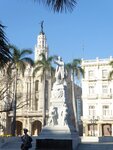


A year ago, a breakthrough was expected in the U.S.-Cuba economic relationship when the Biden administration approved the first OFAC license allowing direct investment in and direct financing to a privately-owned Cuban company. However, no funds have been delivered, due to a lack of regulatory framework by the Cuban government, and conviction in Washington is lacking.
The Office of Foreign Assets Control (OFAC) authorized this unprecedented license on May 10, 2022, paving the way for U.S. capital to flow into Cuba's micro, small, and medium-sized enterprises (MSMEs).
This leads to a crucial question: What is the incentive for the Biden-Harris administration to encourage OFAC and the Bureau of Industry and Security (BIS) to issue more licenses or develop general licenses for direct investment and financing until Cuba’s regulatory mechanisms are in place?
Experts in U.S.-Cuba relations believe there's little incentive. “Tragically, there is no incentive for the OFAC to issue licenses or further develop general licenses until the government of Cuba issues regulations authorizing the delivery of direct investment and direct financing to MSMEs in Cuba," a long-time observer of U.S.-Cuba relations based in Washington D.C. remarked.
Despite the Cuban government’s call for direct investment and financing, the lack of regulatory measures suggests a reluctance to fully embrace private sector growth. Rather, the focus seems to ramain on fostering partnerships between state entities and foreign corporations.
The decision by the Cuban government to open the wholesale and retail sector to foreign investors for the first time since 1959 marks a significant shift in Cuba's economic policy. Announced as a measure to alleviate severe commodity shortages and spur local industry, the move could have far-reaching implications for the Cuban economy and provides new avenues for foreign investment.
Under this new policy, foreign investors will be able to fully own Cuban wholesalers — a first since Fidel Castro's 1959 revolution. Retailers, meanwhile, could enter into public-private ventures, introducing a new level of private sector involvement in the Cuban economy.
This decision comes in response to growing domestic pressures. The state's monopoly on foreign trade and retail, as well as widespread shortages of basic goods such as food, medicine, and fuel, have led to mounting public discontent and repeated protests. Inflation has also surged due to the rapid growth in informal trade of essential products.
This opening of the wholesale and retail sector is just the latest in a series of economic reforms by the Cuban government, prompted by economic difficulties. Last year, it permitted small and medium enterprises to begin operating on the island, and even earlier, it authorized private enterprise for individual entrepreneurs.
These reforms signal a significant ideological shift in a country where the government and its affiliate companies have monopolized the economy for decades. Amid the worst economic crisis in 30 years, driven by tightened sanctions under the Trump administration and the fallout of the coronavirus crisis on its critical tourism sector, Cuba is opening its economy in ways not seen before.
For foreign investors, this new policy could provide significant opportunities. It represents a chance to establish a foothold in a market that has largely been closed to foreign investment for over six decades. However, investing in Cuba will still pose challenges
The Foreign Investment Act 118 ,
Enacted in 20145, the 118 Act emerged from a pressing need to stimulate foreign direct investment (FDI) in Cuba, and marks a meaningful shift in Cuba's foreign investment policy. The Act presents a comprehensive framework designed to provide legal guarantees and security to foreign investors. It outlines regulatory measures for taxes, import and export protocols, and insurance.
Article 10 of the Act offers a key assurance to investors, promising that joint ventures and national and foreign investors who are parties to international economic association agreements will be subject to the special tax regime established in the Act until the expiration of the term for which they were authorized.
However, the Act, while offering promising opportunities, is not without its complexities. For example, the Act outlines specific rules regarding the utilization of Cuba's national banking system.
The Law on Foreign Investment introduces improved tax incentives for foreign companies, but it also mandates certain constraints. Notably, foreign companies must employ Cuban workers, but these workers must be hired through a state agency rather than directly by the company. Furthermore, foreign companies must collaborate with Cuban companies that have been approved by the state.
Despite these constraints, the introduction of Act 118 symbolizes a significant turning point in Cuban foreign investment policy, offering potential opportunities to foreign investors. To facilitate this, the government has provided a 'Portfolio of Opportunities for Foreign Investment' document, detailing specific business opportunities in the country.
Potential investors need to tread carefully. While the Act does represent an earnest attempt by the Cuban government to drive foreign investment, it's evident that the focus is on directing funds towards the Cuban government and associated entities rather than individual Cuban businesses.
The introduction of Act 118 showcases Cuba's readiness to welcome foreign investments, but the real potential of these reforms will only unfold with time, based on the stability and continued investor-friendly practices of the Cuban government.
Helms Burton Act, Senator No’s Legacy
While Chairman Bob Menendez (D-NJ) of the Senate Foreign Relations Committee continues to block Biden Administration moves to liberalize Cuban relations, his Clinton Era predecessor in the Chairman’s Seat left the greatest administrative hurdle to open commerce with Cuba.
The Helms-Burton Act (formally known as the Cuban Liberty and Democratic Solidarity (LIBERTAD) Act) was passed by the U.S. Congress in 1996. It was aimed at tightening U.S. sanctions against Cuba and extending them to foreign businesses dealing with Cuba.
One of its most controversial elements is Title III, which allows U.S. nationals (including naturalized citizens) to sue those profiting from properties in Cuba that were confiscated from them by the Cuban government after the 1959 revolution.
For many years, successive U.S. administrations suspended the right to file these lawsuits. However, in May 2019, the Trump administration fully implemented Title III, opening the door for potentially thousands of lawsuits against companies and individuals who are "trafficking" in confiscated property. The U.S. Department of State estimates there are as many as 206,000 potential claims.
In December 2022 a Federal judge in Miami ordered Carnival Cruise Lines and others to pay over $400 million to a firm holding a claim from 1971 with the U.S. Justice Department’s Foreign Claims Settlement Commission, which at the time valued a confiscated steamship terminal at $9.1 million.
Swiss cement giant Holcim settled a suit in 2021 filed by a group of heirs to a sugar plantation on which the Cuban government had built a cement plant. The $800 million suit was backed by claims from 1969 which valued the property at $11 million.
Exxon Mobil, has been pursuing a $280 million claim for Cuban properties confiscated in 1960. The FCSC certified that Exxon predecessors Standard Oil of N.J. and Saucony Mobil. "suffered a loss in the total amount of $71,611,002.90. The Standard Oil refinery at Havana Bay, now operated by CUPET, was the first U.S. property taken over by Castro and his bearded revolutionaries after the company refused to process oil from the Soviet Union as tensions mounted with the United States.
Many countries, including Canada and members of the European Union, have laws in place to counteract the extraterritorial effects of U.S. sanctions. Canada's Foreign Extraterritorial Measures Act (FEMA) does not recognize any judgment given under the Helms-Burton Act in Canada and allows Canadians to counter-sue in Canadian courts.
The European Union says the implementation of the lawsuit provision breaches agreements it struck with the U.S. in the 1990s. A December 2022 decision in the 11th Circuit found the E.U.s Blocking Statute cannot indefinitely stop a U.S. national's HBA lawsuit against an EU company.
Comments
No comments on this item Please log in to comment by clicking here